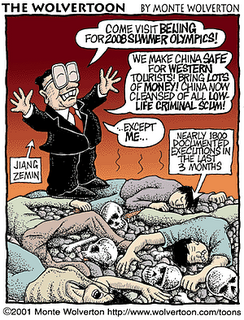Radio Free Asia (via China Post) has reported that 50 Tibetans are detained at the Chinese border in their attempt to seek religious and political freedom. Already the Chinese authorities say the troops opened fire in self-defense. How do they expect people to believe this non-sense? The brutal dictatorship is relentless, is not improving and is showing its true colours in the run-up to the 2008 Olympics--one more reason to boycott the Games.
Take a look at the video here showing CCP troops shooting the Tibetans like dogs.
Taipei Times: SECRET TREK: Some of the 41 refugees who survived after Chinese border guards opened fire on them talked about their experience at a news conference in India.
Advertising For 17 days they waded through Himalayan snowdrifts and climbed ice-covered rocky terrain, cold, hungry and exhausted. Then came the shooting.
Early on Sept. 30, as 75 Tibetan refugees were making a secret trek across the border into Nepal, moving in single file across a mountain slope near the 5,800m high Nanpa La Pass, Chinese border guards opened fire.
One woman -- a 25-year-old Buddhist nun -- was killed immediately, group members said. Chinese officials, in a statement apparently about the shooting, have said a second person also died.
"There was no warning of any kind. The bullets were so close I could hear them whizzing past," Thubten Tsering, a Tibetan monk, told journalists in New Delhi on Monday. "We scattered and ran."
Thubten is among 41 of the refugees who survived the shooting and reached India. The survivors said they do not know the fate of 32 others, including nine children, who were taken into custody by the guards.
"We don't know where they are or what happened to them," said Thubten, his chapped cheeks and exhausted face still bearing the scars of the ordeal.
Tibetan refugee Lobsang Choeden, left, answers a question at a media interaction organized by the Tibetan Center for Human Rights and Democracy as refugees Dolma Palkyid, center, and Thupten Tsering look on, in New Delhi on Monday.
Footage of the incident, shot by a Romanian cameraman on a mountaineering expedition, sparked an international outcry.
The footage, which was released by Romania's Pro TV, shows a distant figure that its narrator says is a Chinese border guard firing a rifle and a separate scene of a person in a line of figures walking through the snow then falling to the ground. An unidentified man near the camera can be heard saying in English, "They are shooting them like, like dogs."
The activist group International Campaign for Tibet, in a written statement, said the video proves Chinese troops fired at unarmed Tibetans and counters a statement from Beijing that its forces were attacked and fired in self-defense.
The pass is a common escape route for fleeing Tibetans.
Thousands have left for Nepal since Chinese forces occupied their Himalayan homeland in 1951. Many make their way to the north Indian town of Dharmsala, the home of the Dalai Lama, the exiled Tibetan Buddhist spiritual leader and a Nobel Peace Prize laureate.
Every year more than 2,500 Tibetan refugees attempt the arduous trek, said Tenzing Norgay of the Tibetan Center for Human Rights and Democracy, which arranged the Monday news conference for the survivors.
When asked about his life in a monastery in Tibet where the monks are under the constant watch of Chinese security forces and under pressure to denounce the Dalai Lama, Thubten said simply: "It was stifling."
"Being a monk who has taken a vow to live by the faith, we were always under threat from the Chinese political authorities," he said.
Dolma Palkyid, a 15-year-old novice nun, was a close friend of Kelsang Nortso, the nun who was killed.
"I had walked ahead and we got separated. Then the shooting took place and we fled. It was four days later that I heard Kelsang was the one who was shot," she said, speaking haltingly and tearfully, through an interpreter.
Once in India, the friends were hoping to join another Buddhist nunnery together, said the red-cheeked teenager dressed in a traditional ankle-length gown.
The group of Tibetan refugees had each paid 5,000 yuan (US$625) to a guide to arrange the trip. They set off around the middle of last month, assured that the 10-day trek would deliver them to Nepal.
There have been instances of refugees being shot at by border guards in the past, but this was the first time in recent years that troops killed any, Tenzing said of the human rights group.
"This is the first time that the world has seen evidence of what Tibetans are subjected to by the Chinese," Tenzing said.
"Kelsang's death cannot go in vain. We will use this incident and the video footage to bring international pressure on China and press for Tibetan freedom," he said.





